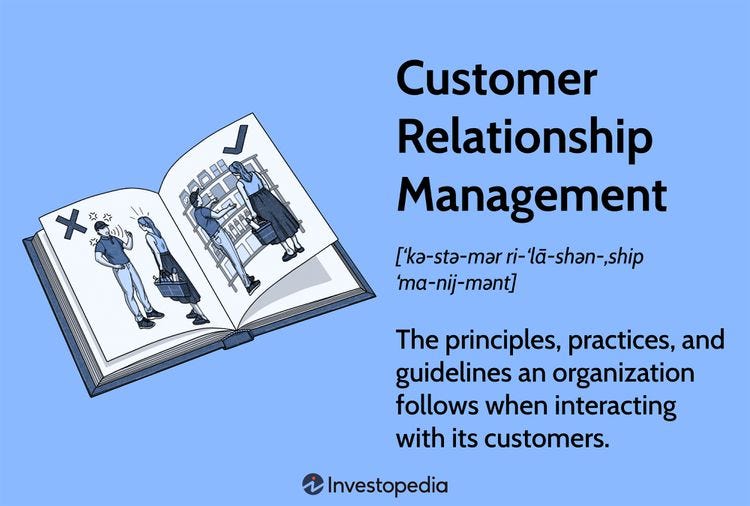Choosing a CRM for your Startup (part 2/2)
A key challenge for startup founders is aligning their software with their business needs. In the second part, we will explore how to select a CRM for a company or adapt a spreadsheet solution.
A key challenge for startup founders is aligning their software with their changing business.
In this article, I want to explore all the options.
Working without a CRM (detailed in the first part)
Building a CRM from scratch (detailed in the first part)
Selecting a CRM
Adapting a spreadsheet solution

3. Selecting a CRM
There are many CRMs on the market. Some are local to each country. Others are for specific industries, like dentists, vets, and lawyers. Then, there are the general ones, like HubSpot, Salesforce, and Zoho CRM.
The easiest part is finding them; the hardest part is defining how to adapt the processes for your CRM (and which one).
Some things to keep in mind when you select a CRM:
Implementation cost - this is a key concern for almost any startup. It's where an enterprise solution fails, like Salesforce and HubSpot for Companies.
Monthly Cost - this is another selection criterion for startups. Even if it’s common to have a single user (for example, for a sales CRM), as soon as you see the value of having different users, you will start to do the math. And sometimes a cost of 30 euros/seat x 25-30 people could mean a lot of money for a startup.
Learning Curve - some solutions are easier to understand and others are more difficult. Take a simple example: Jira vs. ClickUp. One is a solution dedicated to developers working in enterprise environments, and the other is a solution built for startups. You can see this from many angles, especially from the learning curve.
Many solutions offer a directory of local consultants and specialists. They could help you implement your features. You can see this in ClickUp, in Make, in Zapier, and in many other tools. It could be a strong argument in choosing a CRM. This is true if your company lacks the time to invest in that step or wants to reduce the learning curve.
Integrations - A CRM is like the spine of a business. It's hard to know, from the start, which future integrations your business will need. A great CRM would provide API access to almost everything in its database. It would be beneficial for it to include some built-in integrations, such as plugins.
The easiest approach is to look at the solution first, and then to define how you can match your needs with the solution. And this solution is almost always the wrong approach. The CRM marketing department's job is to convince everyone that their solution is the best. Without knowing what you want, anything could be the right solution.
Instead, make a list of desired features. Be as specific as you can. Describe your current processes. Mark anything negotiable. Then, look at the solutions. After mapping your needs with various products, you can assume that a solution fits your needs.
Is a business analyst role combined with a researcher, and that could take time for you. You could externalize the researcher part. Talk with a few consultants from your narrowed list. Let's say the top 3 solutions from your initial research. Together you could indicate whether you could map a feature 100% as it is, or less. And decide about that latter.
You can take a look at the decision matrix build.
4. Adapting a database tool
Many tools exist for structuring data. The most popular are Excel and Google Sheets. But Airtable is a good new alternative.
One of the main features of a CRM is to store and structure data about your customers besides adding new data to the CRM. Unfortunately, those tools aren't great for adding data. But, they work well with integrations. They let you use your current tools in a structured database, like any SQL database.
This solution is an advanced CRM. But startups consist primarily of technical teams. So, it could be a good alternative for building a CRM and adding integrations. It avoids high research, implementation, and license costs.
The main advantages are:
Fast release compared to any other solution if you also consider the research and adoption time.
A higher flexibility compared with other solutions (not with custom ones, of course). That could be a disadvantage for some users who lack familiarity with the database structure.
A lower cost for licensing; most of the solutions are free (such as Google Sheets) or almost free (like Airtable).
Data ownership - Unlike classic CRMs, we own the data when we use our own solution or a tool like Google Sheets. And we can decide if we want to add some extra fields or extra layers of security.
Integrations - By creating a clear data structure, you create a good groundwork for future integrations. Most of the solutions are designed specifically for integration with SQL or Excel-based systems.
Some disadvantages are obvious, and some of them are discovered later in the process, as follows:
Data security - is difficult to define many layers of access to data exist without building a solution above those tools.
Data Integrity - Most solutions allow read/write access to all fields. They also have a traditional data change history. This makes it hard to keep your data intact without becoming a detective.
Scalability - Most of them are scalable in theory, but challenges may arise when we attempt to store a large amount of data.

